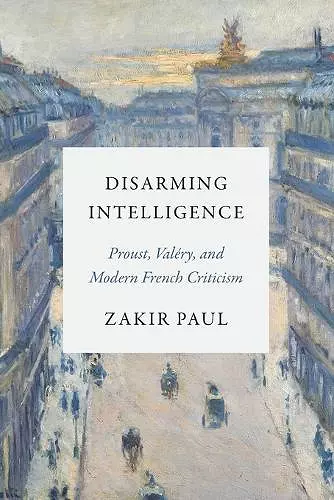Disarming Intelligence
Proust, Valéry, and Modern French Criticism
Format:Paperback
Publisher:Princeton University Press
Published:13th Aug '24
Should be back in stock very soon

A critical account of the idea of intelligence in modern French literature and thought
In the late nineteenth century, psychologists and philosophers became intensely interested in the possibility of quantifying, measuring, and evaluating “intelligence,” and using it to separate and compare individuals. Disarming Intelligence analyzes how this polyvalent term was consolidated and contested in competing discourses, from fin de siècle psychology and philosophy to literature, criticism, and cultural polemics around the First World War.
Zakir Paul examines how Marcel Proust, Henri Bergson, Paul Valéry, and the critics of the influential Nouvelle revue française registered, negotiated, and subtly countered the ways intelligence was invoked across the political and aesthetic spectrum. For these writers, intelligence fluctuates between an individual, sovereign faculty for analyzing the world and something collective, accidental, and contingent. Disarming Intelligence shows how literary and critical styles questioned, suspended, and reimagined what intelligence could be by bringing elements of uncertainty and potentiality into its horizon. The book also explores interwar political tensions—from the extreme right to Walter Benjamin’s engaged essays on contemporary French writers. Finally, a brief coda recasts current debates about artificial intelligence by comparing them to these earlier crises of intelligence.
By drawing together and untangling competing conceptions of intelligence, Disarming Intelligence exposes its mercurial but influential and urgent role in literary and cultural politics.
"Paul offers a very clear presentation of the arguments in each chapter and provides compelling readings of the texts with ample citation, intriguingly tracing the ever-shifting meanings of intelligence, as well as the cultural contexts in which those changes occurred. . . . [T]he book deftly crafts a multifaceted account of intelligence that draws convincingly on the often-intertwined fields of psychology, philosophy, literature, and criticism in the time period under investigation, with helpful accounts of lesser known figures and fresh readings of highly canonical writers such as Proust and Valéry."---Joseph Acquisto, H-France Review
"One of the virtues of Paul’s book is to make staid, naturalized, and otherwise-lapsed critical concepts—intelligence, objectivity, intuition, instinct—come alive in fin-de-siècle debates that often feel unsettlingly contemporary. From Hippolyte Taine’s attempts to quantify intelligence and Henri Bergson’s emphasis on its essential ambiguity, through the literary reflections of Marcel Proust, Paul Valéry, and the critics of the Nouvelle Revue Française, intelligence, we come to discover, was a replenishing source for creative thought. But, far from what one might expect, intelligence, for these major twentieth-century French writers, did not equal creativity. Paul reveals how these and other writers each had their own way of defanging a concept whose meaning, as today, could be marshalled in support of nationalism and social exclusion."---Bécquer Seguín, Critical Inquiry
"Zakir Paul’s book is a fascinating tool that renews the felicitous critical endeavor of establishing a solid interdisciplinary dialogue between literature and social sciences."---Chiara Nifosi, Forma de Vida
"Disarming Intelligence is an impressive and beautifully written work of scholarship, contributing significantly to both French studies and Modernist studies."---Victoria Bergstrom, modernism/modernity
"Paul’s detailed and engaging book argues that the modern French criticism he highlights suggests ways for us to disarm this new society of control by ‘recalling that the definitions and uses of intelligence are always value-laden and thus the object of real disagreement’. . . . Against the universalizing and absolutist tendencies of those wielding the term ‘intelligence’, Paul offers us a welcome reminder that what counts as intelligence is always up for debate."---Patrick Bray, French Studies
"In Disarming Intelligence, Zakir Paul sifts through the philosophical, literary, and scientific notions of intelligence from the late nineteenth century to the mid-twentieth, mainly in the French context. Paul expertly draws out the problematic nature of attempting to pin down intelligence, especially in a quantifying manner. Ultimately . . . intelligence 'is less a concept in any fulsome philosophical sense than an enduring contest over the ways in which the fluctuating term is used.'"---Bryan Counter, Nineteenth-Century French Studies
ISBN: 9780691257983
Dimensions: unknown
Weight: unknown
288 pages